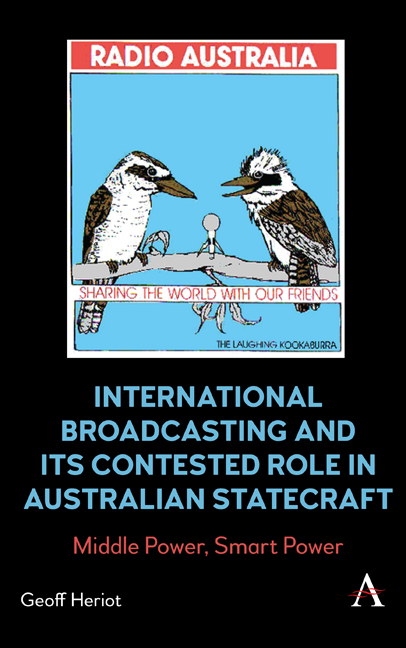 International Broadcasting and Its Contested Role in Australian Statecraft
International Broadcasting and Its Contested Role in Australian Statecraft Book contents
- Frontmatter
- Dedication
- Contents
- List of Figures
- Foreword
- Acknowledgements
- Chapter One Introduction
- Chapter Two Media and the Contest of Ideas
- Chapter Three International Broadcasting and Its Discursive Properties
- Chapter Four Mobilising ‘Softer’ Power in a Hard World
- Chapter Five Australia’s ABC: State Interests, National Evolution
- Chapter Six Purpose, Performance and Evaluation
- Chapter Seven Modernising the ABC
- Chapter Eight Policy, Priorities and Qualified Independence
- Chapter Nine Engaging with Intercultural Audiences
- Chapter Ten Indonesia, the Crucible
- Chapter Eleven Strategic Contingency and War
- Chapter Twelve Looking to the New Disorder
- Index
Chapter Ten - Indonesia, the Crucible
Published online by Cambridge University Press: 15 November 2023
- Frontmatter
- Dedication
- Contents
- List of Figures
- Foreword
- Acknowledgements
- Chapter One Introduction
- Chapter Two Media and the Contest of Ideas
- Chapter Three International Broadcasting and Its Discursive Properties
- Chapter Four Mobilising ‘Softer’ Power in a Hard World
- Chapter Five Australia’s ABC: State Interests, National Evolution
- Chapter Six Purpose, Performance and Evaluation
- Chapter Seven Modernising the ABC
- Chapter Eight Policy, Priorities and Qualified Independence
- Chapter Nine Engaging with Intercultural Audiences
- Chapter Ten Indonesia, the Crucible
- Chapter Eleven Strategic Contingency and War
- Chapter Twelve Looking to the New Disorder
- Index
Summary
Journalist and one-time diplomat Bruce Grant wrote that relations with Indonesia have provided ‘the crucible of modern Australian foreign policy’ (Grant 1972, p. 81). For senior international relations bureaucrat, intelligence chief and analyst Allan Gyngell, it remained the most difficult relationship for Australia to manage of all its Southeast Asian neighbours (Gyngell 2017b, p. 161). Political sensitivities extended beyond the Australia–Indonesia relationship to involve the formerly Australia-administered Papua New Guinea. In the 1970s and 1980s, these co-existed as three countries in close strategic proximity: the archipelagic giant of Indonesia, the recently independent Papua New Guinea with a population of three million and the Western democracy of Australia, a product of colonialism with its own neo-colonialist elements. The three nations were unlike in almost every respect1 – in ethnicity and language, religion and culture, political ideology and governance norms, socio-economic status, topography, and their relative diplomatic and military power. Disparity of circumstance and the strategic proximity of near neighbours provided the crucible for conflicted relationships.
Australia’s relative remoteness from the principal European–Atlantic theatres of Cold War confrontation enabled it to express more easily the persona of a sincere and practical figure ‘helping others out rather than (engaging) in the contest of ideas or geopolitical strategy’ (Walker 2019, p. 63). In 2006, Simon Anholt (p. 46) puzzled over the world’s apparent love for ‘relatively remote’ and ‘exotic’ Australia, noting it was easier for countries not in the mainstream of global politics to achieve good rankings for their ‘nation brand’. But now, with Asia at the fulcrum of geopolitical contestation, Australia is immediately affected and its fundamental organising principle is to ‘stay on the winning side’ (Fernandes 2018, p. 2). The challenge of fitting values into foreign policy becomes greater as national interests become more intense (Gyngell 2017a). For that reason, the crucible of twentieth-century foreign policy might allude to complexities of international political communication in the contested present century. Accordingly, this chapter deals with the potential and the constraints of the international broadcaster’s discursive power projection, in relation to Australia’s transactional and ideological imperatives.
The study of Radio Australia’s broadcasting to Indonesia and Papua New Guinea demonstrates its conduct in relation to the three key success factors discussed in Chapter 6.
- Type
- Chapter
- Information
- International Broadcasting and Its Contested Role in Australian StatecraftMiddle Power, Smart Power, pp. 191 - 222Publisher: Anthem PressPrint publication year: 2023
